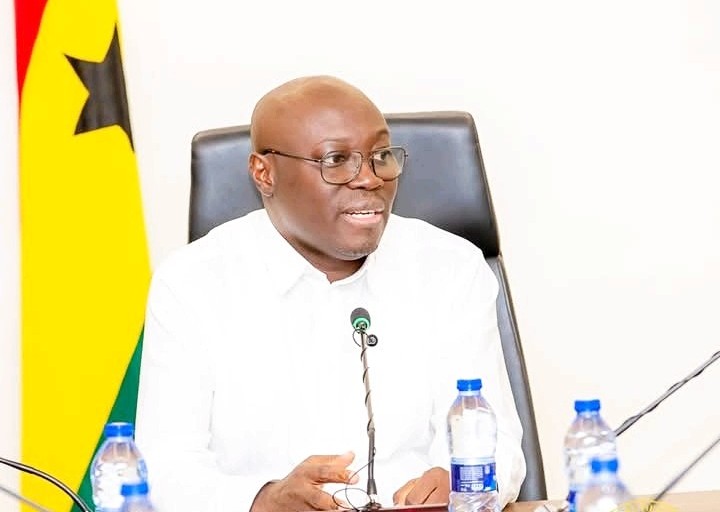
During the 2025 Mid-Year Budget Review in Parliament, Finance Minister Dr. Cassiel Ato Forson made the audacious announcement that, as of right now, no government contracts, regardless of the funding source, will be awarded or paid in foreign currencies. This was done in an attempt to strengthen the Ghanaian cedi and stop the growing trend of dollarization.
President John Dramani Mahama’s instruction is to stabilize the local currency, improve budgetary restraint, and rebuild trust in the cedi as a representation of national sovereignty.
Dr. Forson voiced concerns about the growing usage of foreign currencies, especially the U.S. dollar, in domestic transactions at his presentation of the Mid-Year Budget Review on Thursday, July 24, 2025, with the topic “Resetting the Economy for the Ghana We Want.“
“Unfortunately, foreign currencies are becoming the means of transacting business in Ghana. This trend, if not checked, will erode confidence in our currency, drive inflation, and result in the loss of value in the symbol of our sovereignty,” he told lawmakers. The Finance Minister emphasized that pricing and awarding contracts in foreign currencies pose significant risks to fiscal management, with severe implications for the cedi’s stability. “To curb this unfortunate development, President John Dramani Mahama has directed that, beginning today, July 24, 2025, no contract awarded by the government, irrespective of the source of funding, should be denominated in foreign currency,” Dr. Forson declared.
Additionally, Dr. Forson reminded the audience of Ghana’s legal framework that regulates cash transactions. According to the Foreign Exchange Act, 2006 (Act 723), businesses, organizations, and individuals are not allowed to price, advertise, receive, or pay for goods and services in foreign currencies within Ghana without first obtaining written consent from the Bank of Ghana.
The statement follows concerns expressed by Dr. Johnson Asiama, the governor of the Bank of Ghana, regarding the increasing dollarization of industries like luxury retail, private education, and real estate.
During a July 15, 2025, Graphic Business/Stanbic Bank Breakfast Meeting in Accra, Dr. Asiama issued a warning: Pricing goods and services in foreign currencies weakens macroeconomic stability by violating legal tender laws and undermining public faith in the cedi.
The measure is a component of the Mahama administration’s larger initiatives to fortify the cedi, which Dr. Forson said was the world’s best-performing currency in the first half of 2025, depreciating by more than 50% in comparison to the US dollar.
“Ghanafoʔ, Cedi No Apicki! He said, “We have nearly reversed the devaluation of the cedi experienced in 2022, 2023, and 2024.”
He credited the recovery to the International Monetary Fund’s (IMF) assistance, stricter budgetary constraints, and macroeconomic stabilization programs.
Important economic accomplishments were also emphasized in the Mid-Year Budget Review. The debt-to-GDP ratio dropped from 61.8% to 43.8% as a result of Ghana’s national debt falling from GH¢726.7 billion in December 2024 to GH¢613 billion by June 2025. The nation exceeded the target of 0.4% with a primary fiscal surplus of 1.1% of $5.6 billion in the first half of 2025, nearly triple the previous year’s figure. Additionally, the Bank of Ghana’s international reserves rose to $11.12 billion, covering 4.8 months of imports.
Finance Minister Ato Forson’s 2025 Mid-Year Budget Review: What You Need To Know
However, Dr. Forson acknowledged challenges to the 2025 fiscal framework, including persistent wage pressures, customs revenue shortfalls, smuggling of marine gas oil, and the now-addressed issue of foreign currency contracts. He also noted that a forensic audit is underway to investigate 55 stalled projects where contractors accessed loan funds without corresponding work, some involving inflated variation claims.
The directive has sparked mixed reactions. While some businesses, particularly in importation-heavy industries, expressed concerns about potential complications in pricing goods, others view the policy as a patriotic step toward economic independence.
“Strengthening the cedi is not just a technical economic goal but a patriotic duty that demands discipline across all levels of public and private enterprise,” Dr. Forson said, echoing sentiments shared by the Bank of Ghana.
As Ghana prepares for the fifth review of its IMF Extended Credit Facility program in September 2025, the government remains committed to sustaining fiscal discipline and structural reforms. Dr. Forson concluded,
“This is a story of sound leadership, better economic management, and a restoration of hope to a nation once in despair.”
The policy is expected to reshape government procurement practices and reinforce the cedi’s role as the primary medium of exchange in Ghana, aligning with the administration’s vision of a stable and self-reliant economy.





